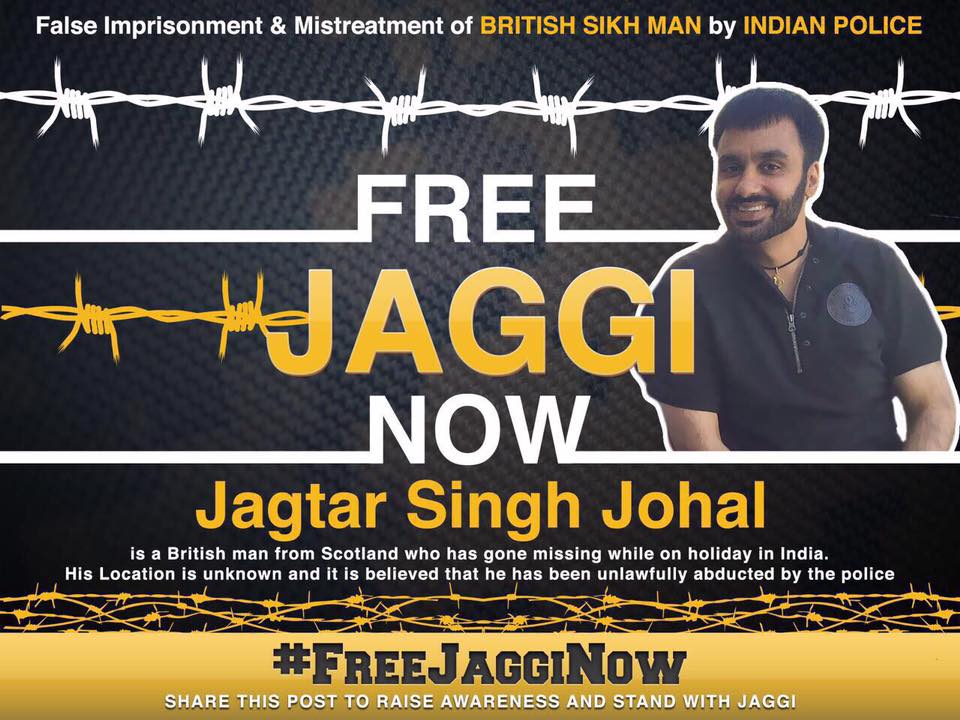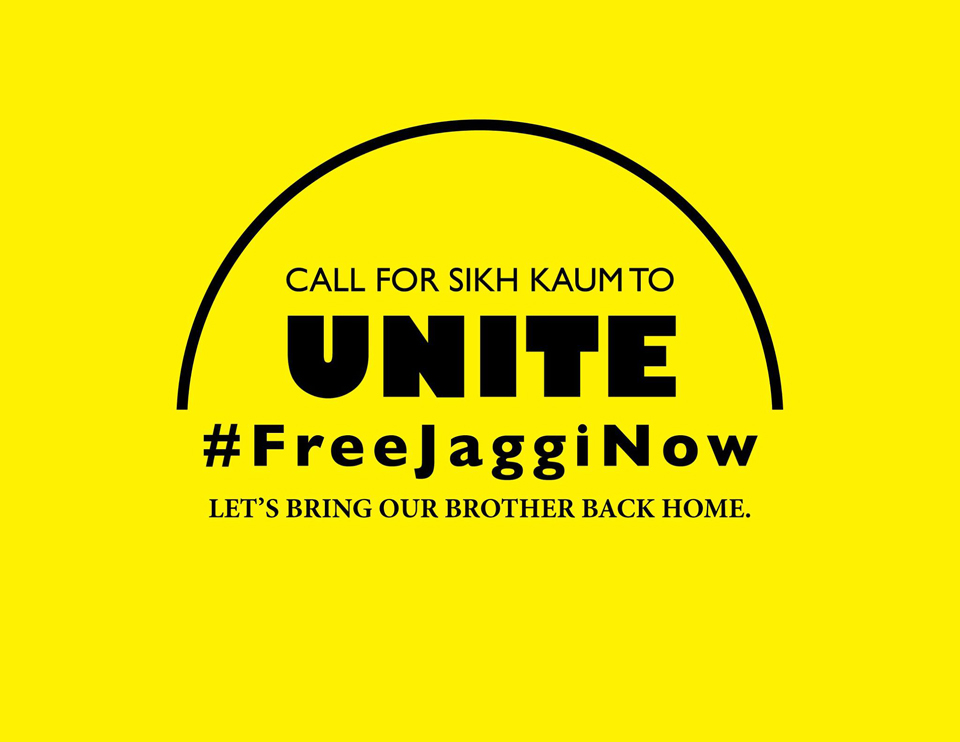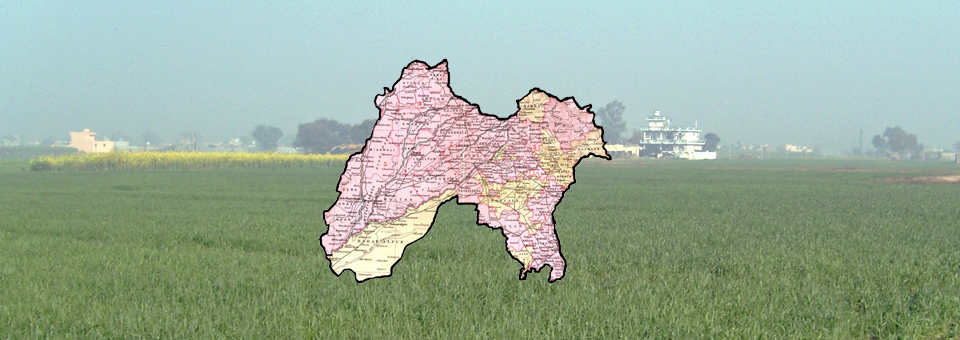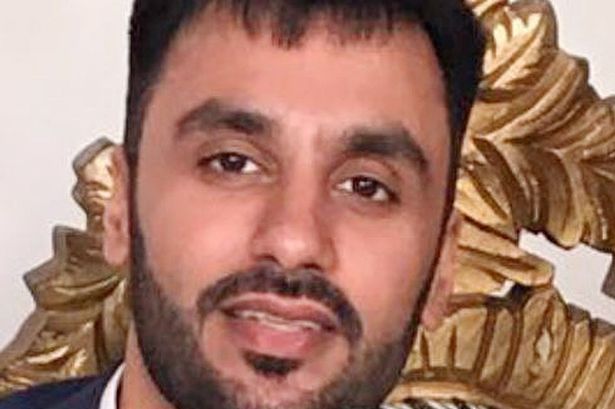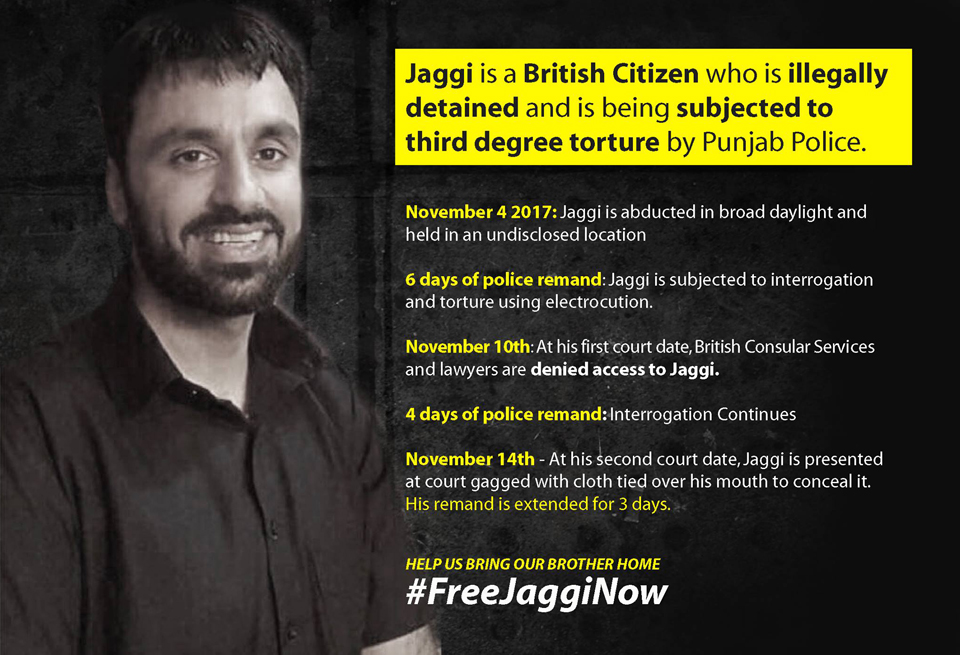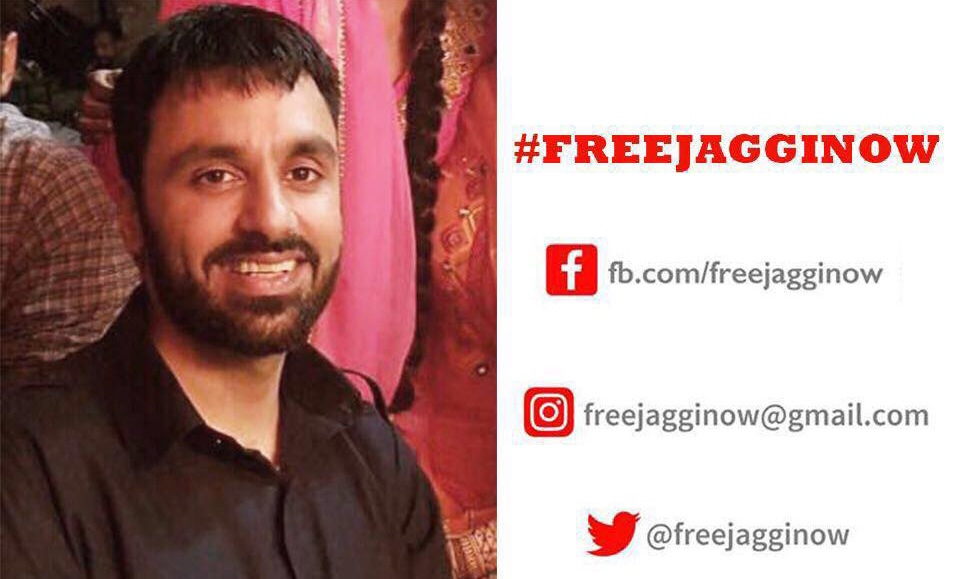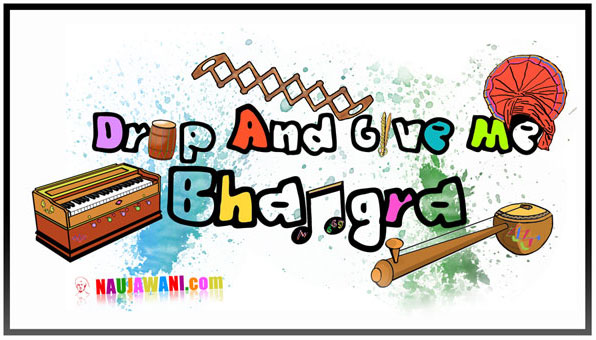PAGE LAST UPDATED AT 1200 ON 14 MARCH 2018
WHAT’S GOING ON?
A Sikh from Scotland named Jagtar Singh Johal was arrested by plain-clothed police officers in Jalandhar, Punjab, on 4 November 2017, whilst he travelled in a car through the shopping district with his newly-wed wife and a female relative. ‘Jaggi’ as he is commonly known, was accosted in broad daylight, had a sack placed over his head and was then taken away to a place(s) unknown. No sight of him was made until 14 November 2017, when he arrived for a Court date under heavy guard with his face shrouded by a bandana and only his eyes visible. For the first time in ten days, Jaggi had access to legal representation who went on to state that he informed them quite specifically of the torture he had received in the preceding days. At the court hearing itself, his police remand was extended for three further days (a previous court hearing on 9 November 2017 was held in secret; Police snuck Jaggi in and out of the building without anybody knowing).
The situation is despicable. Almost three months on, a man born and bred in Scotland who had been in Punjab to participate in his Anand Karaj and celebrate what should have been a joyous event, continues to be incarcerated with no respite from the illtreatment meted out to him. His wife and her immediate family have been traumatised, continuing to face intimidation by the Punjab Police force; Jaggi’s family in Punjab and Scotland are understandably devastated, wracked with worry over his condition and whereabouts; and on a wider scale, Sikhs across the globe are reacting to yet another occasion where the systematic, structural inequality of the Indian justice system has targeted this minority community again.
Jaggi’s voice has been silenced; ours has not. Do not put this issue to the back of your mind; do whatever you can to ensure that this happening does not go ignored. On this page we will continue to share information and add analysis relevant to the case – check back regularly.
WHAT CAN I DO?
Use the hashtag #FreeJaggiNow on social media to help build a wave of activity amongst the global Sikh community, ensuring that this travesty is not allowed to disappear.
Write to your MP (or political representative if outside the UK) to demand that the case of Jagtar Singh Johal be taken up with the Indian authorities.
DO NOT SIGN ANY PETITION OR DONATE MONEY TO ANY FUND AS PER DIRECTIONS FROM THE OFFICIAL CAMPAIGN.
The focus of the #FREEJAGGINOW campaign is to see Jaggi freed and returned to Scotland. However, the reasoning behind Jagtar Singh Johal’s arrest, detention and torture goes much deeper and is an issue that we cannot continue to ignore as a Panth. We have been here before and must learn from our past failings if this type of event is to be prevented from happening again.
Discuss this issue with your families – elders, parents, siblings, offspring and friends. It is a symptom of a much wider malaise that we continue to ignore at our peril.
DEEPER BACKGROUND
The Sikh people have been engaged in a struggle against the Indian State since before it’s inception in 1947. Following the end of World War II, South Asian territories were granted so-called ‘independence’ which was in effect the establishment of two competing powers – India and Pakistan. Despite unsuccessfully advocating for their own geographical home in the region, political intrigue and naivety forced Sikh representative bodies to side with one of the two newly created powers, moving all of their hopes and dreams into East Punjab which now fell under Indian occupation. Two years later, Sikh ambassadors deliberating over the Indian Constitution refused to accept it’s final drafting and as such no Sikh has ever formally adopted Indian statehood on behalf of the Sikh people. From that constitutional rejection seventy years ago began a lifetime’s struggle to the present day during which Sikhs have adopted different forms of opposition from political agitation to civil disobedience, armed conflict to international lobbying, resulting in the current situation: we are without statehood, fundamental rights, and most importantly power.
In 1984, the struggle between Sikhs and the State escalated beyond a point of no return. The Indian State sent armed forces into the Darbar Sahib at Amritsar – the headquarters of the Sikh people – under the pretense of “flushing out militants” in early June. Thousands were killed in both that military operation and simultaneous invasions of key Gurdwareh and institutions across the country. Sikhs around the World were devastated at the sight of armoured tanks rolling into the Darbar Sahib complex and shelling forts, libraries and lecture theatres into oblivion; it was a watershed moment of realisation for most Sikhs, that despite their best efforts to make life work in India, this State was not their own. Retaliation was swift and on the last day of October that year, the Prime Minister of India, Indira Gandhi, was assassinated by two Sikhs (a third was later executed for conspiring with them). But what followed shocked those Sikhs who had not yet awoken to the reality of the community’s position in India. Tens of thousands of Sikhs were brutally murdered, raped and displaced from their homes in Delhi and right across the country in an organised Genocide orchestrated by the State. To this day, few State officials have been charged and sentenced for their role in the massacre.
In the years that followed, armed with this long-awaited realisation that the Indian state was engaged in a civil war with the Sikhs of Punjab, many Sikhs took up arms against the State, carrying out assassinations of perpetrators of both 1984’s invasion and Genocide. By the end of the decade, some parts of the Punjab were being ruled by Sikh groups, backed by arms and the support of everyday people. It was at this juncture that the Indian authorities moved to vanquish all opposition to the State by giving a free-hand to Police authorities, led by Director General of Punjab Police Kanwarpal Gill (aka K.P.S. Gill). In less than ten years, Punjab’s Police force, aided and abetted by consecutive Punjab State Chief Ministers, had annihilated tens of thousands of Sikh youths throughout Punjab using fake Police encounters, enforced disappearances and falsified charges. Coupled with mainstream media propaganda, a drive to infiltrate Sikh intelligentsia, and coordinated attacks on supportive Sikh organisations in the West, by the turn of the Century the Sikh struggle had largely diminished from the gains it had made in the 1980s; instead, internal conflict was agitated and promoted by the State and other agencies, particularly in academia, leading to wholesale divisions within Sikh people.
It was not until 2012 that we saw a major resurgance of Sikh opposition to the Indian state like that of the 1980s and 1990s, this time taking hold amongst a generation that had not even been born when the events of 1984 took place. The incendiary moment came with the formal order of execution of a Sikh prisoner, Balwant Singh Rajoana, who had been implicated in the assassination of the Punjab Chief Minister Beant Singh in 1995. Across the World, but significantly in the Punjab itself, hundreds of thousands took to the streets in protest at the unequal capital punishment sentence meted out to a Sikh prisoner, when others convicted of similar and even worse crimes fared much better. It was again a moment of realisation for those who had seen it all before as well as those who were new to the reality of Sikh displacement in the Punjab, that this was an ongoing struggle for freedom and the right to life with the Indian state – one which we had allowed ourselves to forget had been continuing all the while. A Sikh University student, Jaspal Singh of Gurdaspur was shot dead by Punjab police during the protests, igniting more zeal for change across the Sikh world, but worryingly reminding many who had ‘awoken’ that there were very real and fatal consequences for opposing the Indian State. Over the last five years the Sikh people have waned, ultimately failing to bring about a wave of change as had been witnessed in some parts of the globe in recent years, but the State itself has not halted it’s continued amalgamation of Sikhs and the Punjab into the Indian project.
It is in this backdrop that the case of Jagtar Singh Johal has arisen. Purportedly the charge against him is one of “using social media to infuence”. We are living through times when simply writing about the Sikh struggle is enough to warrant arrest, incarceration and even torture. It is of no matter that one has a British passport, citizenship and rights; in these situations States accommodate other States, not people. Jagtar Singh has been arrested, detained without access to legal advice or representatives of the nation he was born and resides in, declared guilty by the Chief Minister of Punjab no less – all before a single court hearing has been able to look into the allegations made against him. The Punjab State Government website is required by law to reproduce First Information Reports (FIR) online detailing the reasons for the arrest and associated charges; but in this case no such FIR exists. Sikhs have taken to social media to highlight the travesty of what is taking place, but are limited to just creating awareness of what is happening; whilst this is vital in trying to reach those who are in a position to step in and help free Jagtar Singh, it is beyond frustrating.
WHO IS JAGGI?
Jagtar Singh Johal is a 30 year old Sikh from Dumbarton, a town on the bank of the river Clyde to the north-west of Glasgow. Born and raised in Scotland to Punjabi parents, Jaggi as he is commonly known is like many young Sikhs of Punjabi origin growing up in the West – coming to terms with his identity as a UK citizen coloured by cultural leanings originating from his Punjabi ancestry, all underpinned by the teachings of the House of Guru Nanak. Like many Sikhs who take a keen interest in where they came from and how they come to be in host nations, Jaggi takes a keen interest in the recent history of the Sikhs of the Punjab ranging from when the Punjab was divided in two in 1947 to the present day malaise that has left the East Punjab (in India) on the brink of bankruptcy.
I don’t personally know Jagtar Singh Johal, but I know of Jaggi; hobbyist-researchers with an objective eye are few and far between in this area so it is with some shock that I have been taking in the reports of the last week. I would consider Jaggi like many of us writers/researchers touched by the last three decades of events in the Punjab: contemplative of what life is all about, hungry to investigate, and above all else impelled to use our voice for a better tomorrow. Ours is an enviable task, to write about the happenings but remain unaffected by it in our writing. We can feel like imposters at times, so far removed from the Punjab, but caring just as much about what is happening to it; so we put our heart into preserving the stories of those who suffered so greatly, hoping that we can all elarn from what has gone before.
I don’t want any reader to consider this piece piggy-backing on what has befallen Jagtar Singh Johal, but it is important that people understand the kind of person he is and how his work has been used against him in a way that this site as much as any other relating to the Sikhs of Punjab must speak out on. Jaggi contributed indirectly to two articles on naujawani that were collaborative works requiring fact-checking, a draft reading, and even contributions to the text. It is in this light that I say I do not know Jagtar Singh Johal, yet I cannot deny I know Jaggi; and who knows, perhaps I have even met him without realising it.
The first article was titled ‘Make yourself aware of the struggle‘ published on 4 November 2013 under my sole name of authorship. The article was a work borne out of frustration at a time approaching the thirtieth anniversary of the events of 1984. As commemorations of the November Genocide of Sikhs came to a close that year, I felt irritated by the lack of enthusiasm to continue to talk about what took place over a longer period of time. Consulting a counsel of fellow Sikhs engaged with the subject matter, I was challenged to write an article highlighting what could be done all year round by the ‘everyday-activist’. You can see the mark of Jaggi in the two sentences immediately after the compiled list on the page itself, as well as in the text shared below encouraging the reader to gain an appetite for learning.
So what is one expected to do all year round to seek justice for that which took place 29 years ago? What substantive change can an individual in full-time employment or education, with an active social life and familial considerations, hope to make and more importantly, how can they fit that into their everyday lives? In my opinion, our time would be best spent engaging in a process of learning about what took place and on a wider scale learning how to analyse the events that are taking place around us right now.
The second article was titled ‘Hatred over the World Service‘ published on 6 June 2014 under the sole authorship of Shamsher Singh of the National Sikh Youth Federation (NSYF). This article was an an analytical response to a radio documentary aired by the BBC World Service titled ‘Gunfire over the Golden Temple’ broadcast that week as thirtieth commemorations of the Darbar Sahib invasion were in full flow. I had perceived the BBC documentary as part of the continued narrative of the United Kingdom in supporting the Indian version of what took place and was unsurprised to find the entire production riddled with mistakes and anti-Sikh bias. Once again I consulted with a few others and proposed that we would publish a play-by-play response to the most incendiary statements made in the documentary, published under the sole name of Shamsher Singh as he had appeared in it as a (heavily edited) interviewee. Identifying and then selecting statements to challenge is only half of the task; proffering an adequate yet pithy response requires more than what one person could have achieved. In concluding that piece, once again the leanings of Jaggi are clear to read.
Programmes like the one presented by Tully should act as nothing more than a catalyst for conversation and analysis. The real work is to be undertaken in-house; that very real challenge is raising the level of dialogue within our community and inspiring action so that we take ownership of our history and the issues that we identify collectively as being important.
Jagtar Singh Johal is a Sikh from Scotland who wanted others to know about the human rights abuses suffered by Sikhs in the Punjab over the last three decades and more. He is a son, a brother, and now a husband, who has ironically fallen victim to the same wrongs he spent his spare time researching. He is an everyday Sikh – not an Amritdhari, or the public face of a company like naujawani, or a wannabe – just a Sikh who needs his peers, particularly those like him who have grown up as Sikhs in countries outside of the Punjab, to speak for him now.
TIMELINE
2018
14 March – Following a debate in Parliament’s Westminster Hall, Mark Field, Government Minister of state in charge of Asia and the Pacific in the Foreign and Commonwealth Office (FCO), said he would try to raise the matter with Indian Prime Minister Narendra Modi during his visit to the UK for the Commonwealth Heads of Government Meeting (CHOGM) next month, adding that he would also “continue to raise this case at senior levels with Indian authorities“.
5 March – Twelve individuals including Scottish national Jagtar Singh Johal were sent to judicial custody by a special NIA Court, and will be presented at their next hearing on 3 April by video conferencing.
16 February – The special National Investigation Agency (NIA) Court (Mohali) of Ms. Anshul Berry dismissed the NIA request to move Jagtar Singh Johal out of the Punjab to Tihar jail. The same was passed for Taljit Singh ‘Jimmy’, Hardeep Singh Shera and Ramandeep Singh Bagga.
14 February – The special NIA Court approved the 90 day extension for Jagtar Singh Johal as well as for Taljit Singh ‘Jimmy’, Hardeep Singh Shera and Ramandeep Singh Bagga in a separate case.
8 February – The National Investigation Agency (NIA) made application to special NIA Judge (Mohali) Ms. Anshul Berry for the extension of remand of Jagtar Singh Johal. The Court gave the NIA one week to present chargesheets to back up their application.
1 February – Jagtar Singh Johal was presented before Court where no evidence was presented by the National Investigation Agency (NIA) who were reprimanded by the Judge for failing to complete relevant paperwork pertaining to the case. Jagtar Singh Johal was returned to prison at Nabha Jail.
19 January – Jagtar Singh Johal was returned into judicial custody by the NIA two days after they took him into Police remand. His legal counsel received no confirmation from the jail of his return.
17 January – The National Investigation Agency (NIA) took Police remand of Jagtar Singh Johal for five days, without legal counsel permitted to speak on his behalf. Special NIA judge (ASJ) Sanjay Agnihotri approved the remand at a court hearing that was made without notification to any persons.
2 January – Jagtar Singh Johal presented before special NIA Court where it was stated he was no longer required in any of the cases. He was committed to 30 days’ judicial custody at Nabha jail.
2017
26 December – The NIA demanded ten day’s extension to the remand of Jagtar Singh Johal. The duty Judge in Mohali gave seven days extension for remand.
22 December – Jagtar Singh Johal was sent into Judicial Custody until 20 January. He was immediately re-presented before the Special NIA Court on a different case and placed on 4 days’ Police remand.
19 December – Human rights organisations REDRESS and ENSAAF file an urgent appeal to the United Nations Special Rapporteur on Torture in the case of Jagtar Singh Johal.
19 December – Jagtar Singh Johal sent to 3 days Police Remand by a Special NIA Court.
16 December – British Sikhs rebuked Foreign Minister Mark Field MP for remarking that Jagtar Singh Johal was “fine“. Johal’s MP Martin Docherty-Hughes was furious at the comment.
15 December – Khanna Police Remand was extended by two days for Jagtar Singh Johal.
14 December – National Investigation Agency (NIA) took over six more cases at the request of the Punjab Government.
11 December – Indian MP Dharamvir Gandhi representing Patiala, challenges the Punjab Government to substantiate its claim that the Pakistani ISI was behind recent murder cases.
11 December – Khanna Police obtained Police Remand of Jagtar Singh Johal for four days on a separate murder charge.
6 December – Both Jagtar Singh Johal and fellow Sikh prisoner Jimmy Singh had their Police remand extended by a further day.
4 December – Jagtar Singh Johal’s Ludhiana police remand was extended by a further day. A request to further extend the police remand of fellow Sikh prisoner Jimmy Singh was refused and he was ordered into judicial remand. However, hours later he was brought before the Court on a different murder case for which he was given police remand for two days.
2 December – A Judicial magistrate refused to extend the Ludhiana police remand of Jagtar Singh Johal, but agreed to a transit remand so that he could be questioned on a different criminal case. Later he was re-presented before the Court and was ordered to Ludhiana police remand for a further two days on a different case.
1 December – Punjab Government announces that all eight murder cases currently being investigated by the Punjab police are being handed over to the National Investigation Agency (NIA). This comes after Chief Minister Captain Amrinder Singh had declared all of these cases were solved back on 7 November.
30 November – Judicial magistrate extends Ludhiana police remand of Jagtar Singh Johal for two further days for the secure recovery of his passport, despite it being lodged with the British EMbassy in New Delhi since 8 November.
28 November – The court of a Judicial magistrate once again extends Ludhiana police remand of Jagtar Singh Johal for two further days. Fellow Sikh prisoner Jimmy Singh had his police remand extended by three further days, once again. Advocate Jaspal Singh Manjhpur brought to the court’s attention that a previous order directing Punjab police to allow British High Commission officials to meet with Jagtar Singh Johal privately had been violated, but this fell on deaf ears.
25 November – Judicial court extends Ludhiana police remand of Jagtar Singh Johal for two further days. Fellow Sikh prisoner Jimmy Singh had his police remand extended by three further days.
25 November – Despite court direction, delegates from the British High Commission were refused access to meet Jagtar Singh Johal privately and at the scheduled time.
24 November – Jagtar Singh Johal presented before a duty magistrate in Ludhiana; upon being asked if he wished to comment, Jaggi proclaimed his innocence and requested he be permitted to speak to the British High Commission in private. The Court approved the request and allocated a 1-hour time slot for the meeting later in the evening. Police remand was extended for four further days.
23 November – Reported that the British Deputy High Commissioner was refused access to Jagtar Singh Johal as Police withdrew consent for UK officials late the night before.
22 November – Chief Minister of Punjab Captain Amrinder Singh denies allegations that Jagtar Singh Johal had been tortured by the Punjab Police.
21 November – Responding to a question asked by the MP for West Dunbartonshire Martin Docherty-Hughes of the Scottish National Party (SNP) in Parliament, Foreign Office Minister Rory Stewart states: “We take any allegation of torture very seriously, as would the Indian Government. It is completely unconstitutional, it is offensive to the British Government and we will work very closely to investigate, and, of course, we will take extreme action if a British citizen is being tortured.”
20 November – British Prime Minister Theresa May responds to a question about Jagtar Singh Johal’s torture claim by stating that representatives of the Foreign and Commonwealth Office had met with him, and were “pursuing the case with concern and will take action if necessary“.
20 November – Advocate Jaspal Singh Manjhpur refuted the claims of the Punjab Police and elaborated on how events had transpired regarding his client Jagtar Singh Johal, who was denied access to an independent medical examination.
20 November – In an official statement, Punjab Police refuted allegations of torture in the present cases.
19 November – A duty magistrate extended the Police remand of Jagtar Singh Johal and another Sikh Jimmy Singh, for five further days in Ludhiana. Legal access is permitted for up to one hour every 24 hours.
19 November – Sikhs in Melbourne, Australia, protest the Indian High Commissioner and Consulate General who arrive for a formal visit to a Gurdwara in the State of Victoria. Video footage of Sikh protestors engaging the Indian officials directly in conversation went viral.
17 November – Canadian MP Cheryl Hardcastle writes to Canadian Minister of Foreign Affairs raising concerns about reports of torture to Jatar Singh Johal.
17 November – Despite the earlier court decision to move Jagtar Singh Johal into judicial remand (away from Police incarceration), he is moved back in to Police detention, this time in Ludhiana under a different criminal case. Approval for two days of detention is granted by an area magistrate judge at her residence in Sarabha Nagar of Ludhiana at 9pm in the presence of a Police guard around Jagtar Singh Johal, and advocate Jaspal Singh Manjhpur attending through his own exertions.
17 November – Jagtar Singh Johal is presented in court where he is placed into judicial remand until 30 November, outside of Punjab police detention, but in a place unknown. Although he was able to meet briefly with his legal representation and a representative of the British High Commission, their business cards handed over to him were removed from his pockets by Police as he was being led away and fresh clothes given to him by family members were also rejected by Police. There was no concrete decision made on a court mandated independant medical.
16 November – Amarjeet Sohi, MP for Edmonton Mill Woods in Canada sympathises with Jagtar Singh Johal; Sohi himself had been a victim of police brutality in Punjab.
16 November – Protests in Amritsar and London call for Jagtar Singh Johal to be freed. At the London protests outside the Foreign and Commonwealth Office (FCO), officials confirm that a senior case worker will now be assigned to Jagtar Singh Johal.
16 November – Canadian MPs Raj Grewal and Randeep Singh Sarai write to the High Commissioner of India to Canada to highlight the case of Jagtar Singh Johal.
14 November – Martin Docherty-Hughes writes to Foreign Secretary Boris Johnson again about the case of Jagtar Singh Johal highlighting the statement of advocate Jaspal Singh Manjpur that Jaggi has been tortured by police in India. He reiterates that Jagtar Singh Johal must have access to consular support to ensure his human rights are protected.
14 November – Former journalist and senior Aam Aadmi Party (AAP) leader and Member of Legislative Assembly (MLA) for Kharar, Kanwar Sandhu issues a statement advocating for a joint inquiry into the case of Jagtar Singh Johal.
14 November – Jagtar Singh Johal presented in court and has access to brief meeting with legal representation for the first time in ten days to whom he discloses that he has been tortured whilst in Police detention. The court moved that he be remanded in Police custody for a further three days.
13 November – Punjab-based news media company Sikh Siyasat reveal that First Information Report (FIR) on which Jagtar Singh Johal was arrested is not available online to the public as required by law
13 November – Letter sent by ‘All Party Parliamentary Group for British Sikhs’ chaired by Preet Kaur Gill MP to Foreign Secretary Boris Johnson highlighting the case of Jagtar Singh Johal
12 November – Letter sent by Slough MP Tanmanjeet Singh Dhesi to UK Foreign Secretary Boris Johnson highlighting the case of Jagtar Singh Johal
12 November – Gurpreet Singh Johal, brother of Jagtar Singh Johal, appeals to the Sikh community for their support in campaign to #FreeJaggiNow
10 November – The MP for West Dunbartonshire Martin Docherty-Hughes of the Scottish National Party (SNP) states his deep concern at the arrest and imprisonment of Jagtar Singh Johal.
10 November – Jagtar Singh Johal is presented secretly in court without access to legal representation or the British Consular Services both of whom were awaiting his arrival
9 November – UK-based Sikh groups led by the Sikh Federation UK raise their concerns at Jagtar Singh Johal’s arrest and the likelihood that he is undergoing torure
7 November – Chief Minister of Punjab Captain Amrinder Singh compromises the case and extinguishes the possibility of a fair trial by claiming that eight murders had been solved with four arrests (including that of Jagtar Singh Johal)
5 November – Jagtar Singh Johal presented in Court and placed under Police remand for five days
4 November – Jagtar Singh Johal abducted by plain-clothed Police officers whilst out shopping with his newly-wedded wife and a female relative in Jalandhar
18 October – Anand Karaj of Jagtar Singh Johal attended by members of his family from Scotland
2 October – Scottish national Jagtar Singh Johal travels to Punjab in anticipation of his wedding.
KEY LINKS
Campaign to #FreeJaggiNow: Facebook / Twitter
Reliable updates from UK Sikh orgs: Sikh Press Association / Sikh Federation UK
Trustworthy news coverage from Punjab: Sikh Siyasat News


